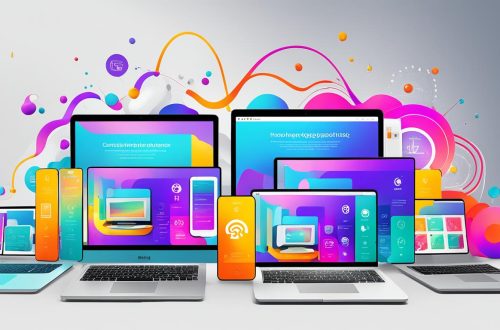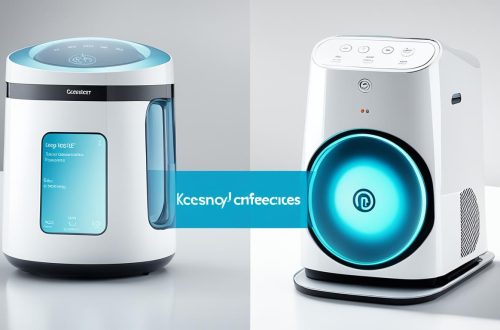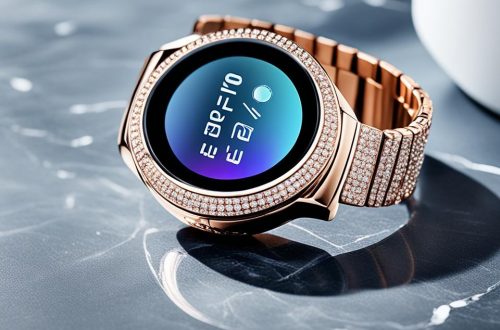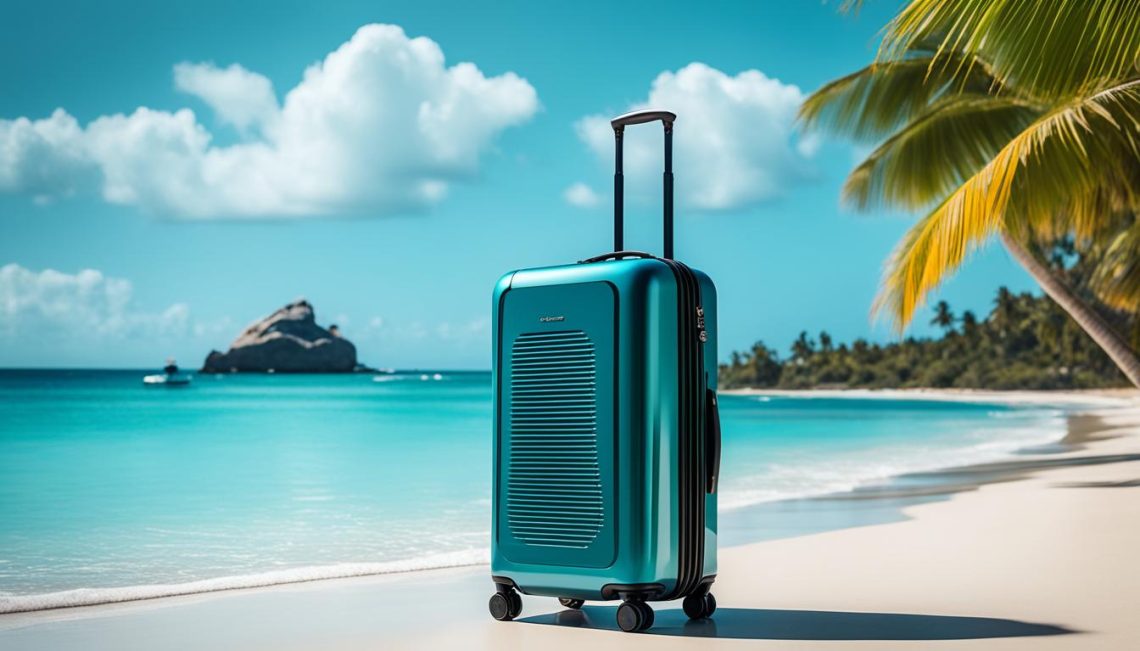
Transforming the Luxury Travel Experience: The Role of IoT in Smart Luggage and Accessories
The Internet of Things (IoT) has revolutionized various industries, and the travel sector is no exception. With the advent of IoT technology, luxury travel experiences have undergone a significant transformation. From smart luggage to tech-driven accessories, IoT has paved the way for a new era of personalized and connected travel.
Imagine a world where your suitcase knows exactly where it is at all times, eliminating the stress of lost luggage. Picture smart devices that enhance your stay in luxurious hotels, catering to your preferences and delivering exceptional service. This is the reality that IoT has brought to the luxury travel industry.
Key Takeaways:
- IoT technology enables personalized and real-time monitoring in the luxury travel sector.
- Smart luggage and tech-driven accessories enhance customer experiences and provide convenience and peace of mind.
- IoT improves operational efficiency by gathering data and making informed decisions.
- Contactless services and predictive analytics contribute to safety and security in travel.
- IoT plays a vital role in the industry’s sustainability efforts, promoting energy management and waste reduction.
IoT Redefining Personalization in Travel
The integration of IoT technology in the travel industry has revolutionized the way companies engage with their customers. By leveraging IoT, businesses gain valuable insights into customer behavior, enabling them to enhance efficiency and deliver personalized experiences. From real-time luggage tracking to creating smart rooms based on individual preferences, IoT is transforming the luxury travel experience.
One example of IoT’s impact on travel is Delta Air Lines’ utilization of IoT to monitor luggage in real-time. Through the use of IoT devices, travelers can now have peace of mind knowing their belongings are being tracked throughout their journey. This not only increases customer satisfaction but also streamlines operations and enhances overall efficiency.
Hotels are also embracing IoT to create smart rooms that cater to guests’ preferences. Hilton and Marriott, for instance, have implemented IoT technology to provide guests with personalized experiences. Smart rooms equipped with IoT devices offer customized lighting, temperature control, and entertainment options based on individual preferences. This level of personalization enhances the luxury quotient of travel, creating memorable experiences for guests.
Furthermore, IoT enables hotels to gather data on customer preferences and behavior, allowing them to offer tailored recommendations and services. By analyzing IoT-generated data, hotels can anticipate guest needs and provide a seamless and personalized experience. Whether it’s suggesting nearby attractions or adapting room settings based on occupancy patterns, IoT-powered smart rooms elevate customer satisfaction to new heights.
The Benefits of IoT-Powered Personalization in Travel:
- Enhanced customer experiences through personalized recommendations and tailored services
- Increased operational efficiency by optimizing resource usage based on real-time data
- Streamlined processes, such as automated check-ins and room customization
- Improved customer loyalty and brand differentiation through innovative technology
With IoT’s ability to gather data on customer behavior and preferences, businesses in the travel industry can offer personalized experiences that exceed expectations. From airlines tracking luggage to hotels creating smart rooms, IoT is redefining personalization in travel, ensuring every journey is unique and tailored to the individual.
IoT is reshaping the travel industry by leveraging data and technology to deliver personalized experiences that cater to the needs and desires of travelers. As more companies adopt IoT solutions, the luxury travel experience will continue to evolve, providing customers with seamless journeys and unforgettable memories.
Boosting Operational Efficiency with IoT
The Internet of Things (IoT) is not only revolutionizing customer experiences but also driving operational efficiency in the travel industry. According to Verizon’s report, 77% of companies have witnessed a remarkable improvement in operational efficiency after implementing IoT solutions. By harnessing IoT technology, businesses can gather valuable data, make informed decisions, and significantly reduce costs across various sectors.
For airlines, IoT enables effective management of food service inventory, ensuring timely replenishment and reduced waste. Real-time data tracking allows airlines to optimize their supply chain, leading to cost reduction and improved operational efficiency. Meanwhile, hotels can utilize IoT to optimize energy consumption in rooms. By implementing smart solutions such as automated climate control systems and occupancy sensors, hotels can provide personalized comfort to guests while reducing energy wastage.
Operational Efficiency in Various Sectors:
Airlines:
- Manage food service inventory
- Optimize supply chain
- Reduce costs and waste
Hotels:
- Optimize energy consumption
- Create personalized room experiences
- Enhance operational efficiency
Car Rental Services:
- Streamline fleet maintenance
- Monitor vehicle performance
- Reduce downtime and repair costs
IoT data gathering empowers businesses with valuable insights, enabling them to make data-driven decisions and optimize workflow processes. With real-time information at their fingertips, companies can identify and resolve bottlenecks, streamline operations, and improve overall efficiency. By leveraging IoT technology, the travel industry can transform its operations, ensuring a seamless, cost-effective, and sustainable experience for both businesses and travelers.
Investing in IoT for Cost Reduction:
The implementation of IoT solutions undoubtedly incurs some upfront costs. However, the long-term benefits far outweigh the initial investment. With IoT-driven operational efficiency, businesses can save on energy costs, reduce waste, and improve resource utilization. Moreover, optimized supply chains and streamlined processes result in faster turnaround times and reduced labor expenses. Ultimately, these cost-cutting measures contribute to improved profitability and a competitive edge within the travel industry.
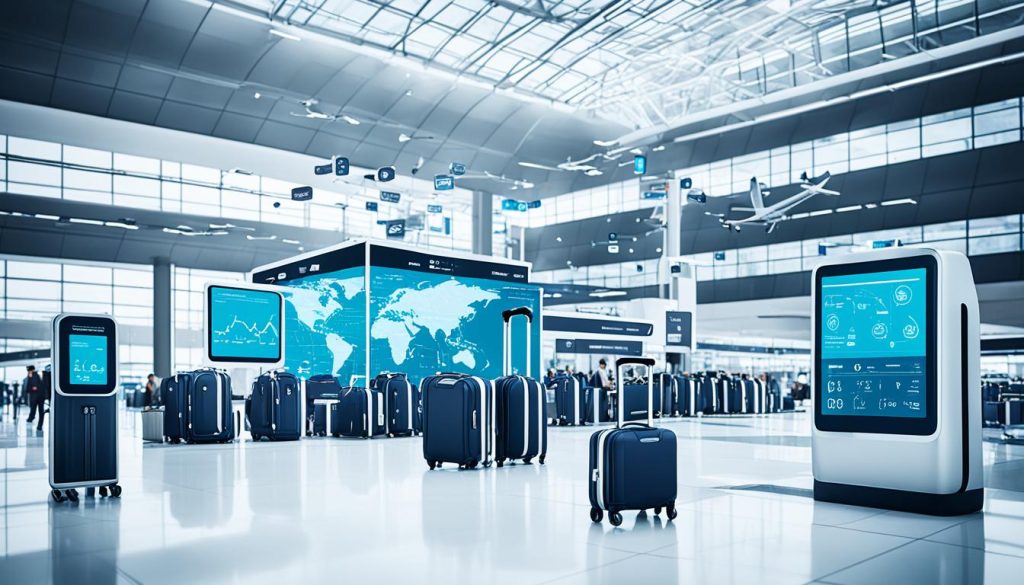
Safety and Security in a Post-Pandemic World
Amidst the ongoing pandemic, safety and security have become paramount concerns in the travel industry. The Internet of Things (IoT) is playing a crucial role in ensuring a seamless and secure travel experience.
IoT technology enables the implementation of contactless services, such as Disney’s MagicBands, which revolutionize the way guests access parks, hotel rooms, and make purchases without the need for physical contact. These contactless services not only enhance convenience but also reduce the risk of virus transmission in crowded areas.
“IoT provides businesses with predictive analytics that enable them to outperform competitors and make intelligent decisions.” – Industry Expert
Predictive analytics, powered by IoT, help businesses gain valuable insights into consumer behavior, allowing them to anticipate customer needs and preferences. By leveraging these insights, businesses can improve their safety and security measures, catering to the unique demands of a post-pandemic world.
Enhanced Safety Measures with IoT
One of the significant advantages of IoT technology is its ability to enhance safety measures throughout the travel journey. From airports to hotels, IoT-enabled devices and systems provide real-time monitoring, ensuring the well-being of travelers.
In airports, IoT sensors and cameras enable touchless security checks, reducing physical contact and minimizing the risk of spreading infectious diseases. Baggage tracking systems equipped with IoT technology enable travelers to monitor their luggage in real-time, enhancing peace of mind.
Predicting and Preventing Security Risks
IoT’s predictive analytics capabilities aid businesses in identifying and mitigating potential security risks. By analyzing vast amounts of data gathered through IoT-connected devices, companies can detect irregularities, identify patterns, and predict security threats.
Airlines can leverage predictive analytics to identify suspicious behavior or abnormal activities, allowing them to take proactive steps to prevent security breaches. Hotels can monitor guest movements and activities using IoT devices, ensuring a safe and secure environment for all guests.
Creating a Seamless Travel Experience
IoT technology aims to create a frictionless and enjoyable travel experience by seamlessly integrating various touchpoints. Contactless check-in and check-out processes, enabled by IoT, eliminate the need for unnecessary physical contact and reduce waiting times.
| Contactless Services | Benefits |
|---|---|
| Disney’s MagicBands | Convenient access to parks, hotel rooms, and purchases without physical contact |
| Smart Locks | Secure and touchless room access for guests |
| Mobile Payments | Seamless and cashless transactions |
By leveraging IoT-enabled contactless services, the travel industry can prioritize the safety and security of travelers without compromising convenience or efficiency.
Stay tuned for the next section where we explore how IoT is contributing to a greener tomorrow in the travel industry.
A Greener Tomorrow with IoT in Travel
The integration of Internet of Things (IoT) technology in the travel industry is not only enhancing customer experiences and operational efficiency but also contributing to a more sustainable future. According to a survey conducted by Inmarsat, 65% of organizations believe that IoT is vital in improving environmental sustainability.
One of the key ways IoT technology promotes sustainability is through energy management. By utilizing IoT sensors and devices, companies can monitor and optimize energy usage in various travel-related settings, such as hotels, airlines, and cruise ships. This efficient energy management not only reduces carbon emissions but also leads to significant cost savings for businesses.
IoT also plays a crucial role in waste reduction within the travel industry. Through smart sensors and real-time data monitoring, companies can track waste production and identify areas for improvement. For instance, Carnival Cruise Line utilizes IoT sensors to monitor energy usage and minimize waste, contributing to a greener and more eco-friendly cruise experience.
“[IoT] technology is helping the travel industry make strides in sustainability.”
In addition to energy management and waste reduction, IoT enables the tracking of carbon footprints. By collecting data on transportation, energy consumption, and other factors, companies can accurately measure their carbon emissions and identify strategies to reduce their overall environmental impact.
With the help of IoT, the travel industry is actively embracing sustainable practices and making significant progress towards a greener tomorrow. By harnessing the power of IoT to manage energy, reduce waste, and track carbon footprints, companies are not only reducing their environmental impact but also setting a positive example for other industries to follow.
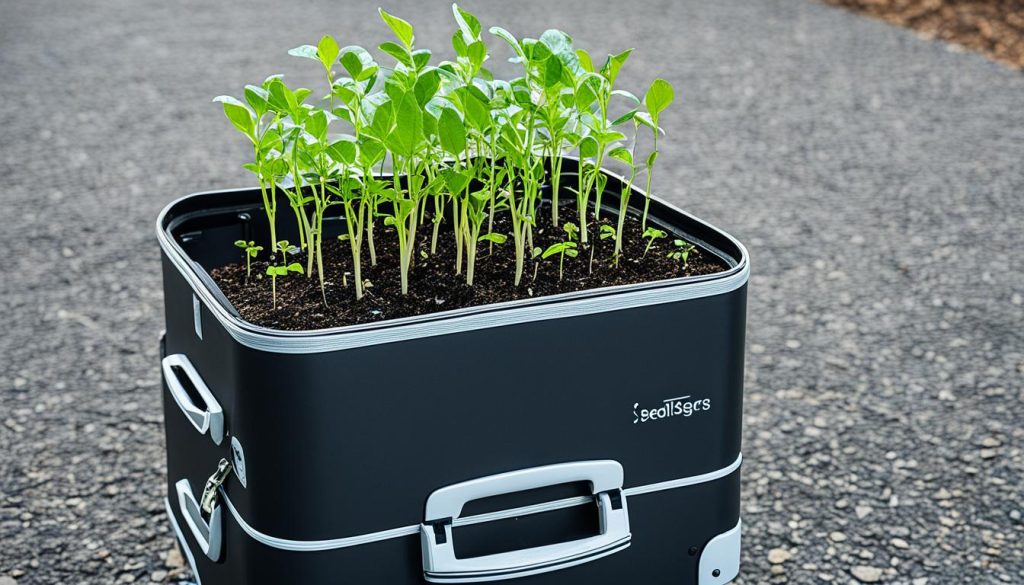
Advantages of IoT in Sustainable Travel:
- Efficient energy management
- Reduced waste production
- Accurate tracking of carbon footprints
- Cost savings for businesses
- Positive impact on the environment
The Road Ahead for IoT in Travel
The transformative power of IoT in the travel industry is undeniable. With its ability to connect devices and gather data, IoT is rapidly transforming the way we experience travel. From enhancing customer satisfaction to improving operational efficiency and promoting sustainability, IoT is reshaping the entire travel ecosystem.
Transforming the Travel Industry
IoT is revolutionizing the travel industry, enabling businesses to provide personalized and seamless experiences to their customers. By leveraging IoT technologies, travel companies can gather valuable data about customer preferences, behaviors, and patterns. This data can be utilized to deliver tailored services and recommendations, ultimately enhancing customer satisfaction. Whether it’s recommending personalized itineraries, suggesting local attractions based on individual interests, or providing real-time updates on flights and accommodations, IoT is elevating the travel experience to new heights.
Maximizing Return on Investment
Despite the initial implementation costs, investing in IoT technology has the potential to deliver a significant return on investment (ROI) for travel companies. By leveraging IoT devices and sensors, businesses can optimize operational efficiency, streamline processes, and reduce costs. For example, using IoT-enabled inventory management systems can help airlines and hotels track and manage their resources effectively. Additionally, IoT-powered analytics can provide valuable insights into customer behaviors and preferences, enabling targeted marketing campaigns that drive revenue growth.
Improving Efficiency and Sustainability
IoT is a game-changer when it comes to improving efficiency and sustainability in the travel industry. By harnessing the power of connected devices, travel companies can optimize their operations, reduce energy consumption, and minimize waste. For example, smart lighting and temperature control systems in hotels can automatically adjust settings based on occupancy, leading to significant energy savings. Additionally, IoT-enabled waste management solutions can help reduce environmental impact by accurately tracking and optimizing waste disposal processes.
“The potential of IoT in the travel industry is immense. By embracing IoT technology, travel companies can unlock new levels of efficiency, customer satisfaction, and sustainability.”
Embracing the Future of Travel
The road ahead for IoT in the travel industry is promising. As this technology continues to advance, we can expect even more innovative applications and solutions in the coming years. From smart airports and connected transportation systems to personalized travel recommendations and seamless digital experiences, IoT is poised to transform every aspect of the travel industry. The key lies in embracing this digital revolution and harnessing its full potential to reshape the way we explore the world.
As IoT continues to revolutionize the travel industry, businesses that leverage this technology will gain a competitive edge. By investing in IoT infrastructure and solutions, companies can set themselves on a path to success, ensuring enhanced customer experiences, improved operational efficiency, and a more sustainable travel ecosystem.
The future of travel is IoT-driven, and the time to embark on this transformative journey is now.
The Impact of Smart Luggage in the Travel Industry
The global smart luggage market is experiencing a significant growth trajectory, fueled by evolving customer needs and demands for innovative and user-friendly travel solutions. Smart luggage combines cutting-edge technology with practical features to enhance the travel experience. From GPS tracking and automated locking systems to USB charging ports and digital scales, smart luggage offers convenience, security, and peace of mind to travelers.
Smart luggage is designed to cater to various travel needs and preferences, making it a popular choice among modern travelers. The market is segmented based on technology, connectivity, and application, allowing consumers to find the perfect smart luggage that aligns with their specific requirements. The following are the key segments:
- Technology: Smart luggage incorporates a range of advanced technologies that enhance its functionality. These technologies include GPS tracking, automated locking systems, USB charging ports, and digital scales. Each technology has its unique features and benefits that cater to different travel needs.
- Connectivity: Smart luggage utilizes various connectivity options to provide seamless functionality. These connectivity options include Wi-Fi, GPS, RFID, and Bluetooth. By leveraging these connectivity technologies, smart luggage enables real-time tracking, proximity sensing, remote locking, and digital scaling.
- Application: Smart luggage serves multiple purposes and applications to meet the diverse needs of travelers. The applications of smart luggage range from real-time tracking of belongings to proximity sensors that alert travelers when their luggage is out of range. Additionally, smart luggage offers features like remote locking for added security and digital scaling to ensure compliance with airline weight restrictions.
The growth forecast for the smart luggage market remains promising, as technological advancements continue to drive innovation in the travel industry. With increased connectivity, improved tracking capabilities, and enhanced convenience features, smart luggage is revolutionizing the way people travel.
Innovative Features of Smart Luggage
Smart luggage is equipped with a wide range of features designed to enhance the travel experience:
- GPS Tracking: Built-in GPS technology allows travelers to track the location of their luggage in real-time, providing peace of mind and reducing the risk of loss.
- Automated Locking Systems: Smart luggage comes with automated locking systems that provide secure access to belongings and protect against theft.
- USB Charging Ports: With built-in USB charging ports, smart luggage allows travelers to conveniently charge their devices on the go.
- Digital Scales: Digital scales integrated into smart luggage helps travelers accurately measure the weight of their bags, ensuring compliance with airline restrictions.
Incorporating these innovative features, smart luggage has quickly gained popularity among travelers seeking a hassle-free and technologically advanced travel experience.
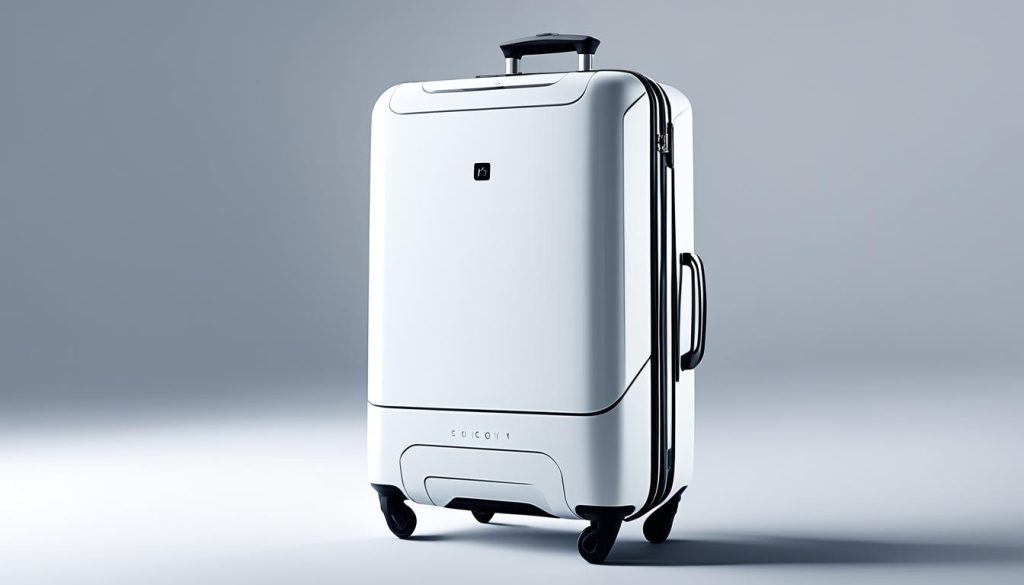
The Future of Smart Luggage
As technology continues to advance and consumer demands evolve, the smart luggage market is expected to witness substantial growth. The integration of IoT technology and the increasing adoption of smart devices will further propel the market forward. The convenience and security offered by smart luggage, coupled with its ability to cater to individual travel preferences, make it a game-changer in the travel industry.
With continuous innovations in connectivity, application, and user experience, smart luggage is set to redefine the way people travel. As more travelers recognize the benefits and value of smart luggage, the market size is projected to expand exponentially in the coming years.
| Segment | Technology | Connectivity | Application |
|---|---|---|---|
| 1 | GPS tracking | Wi-Fi | Real-time tracking |
| 2 | Automated locking systems | GPS | Proximity sensors |
| 3 | USB charging ports | RFID | Remote locking |
| 4 | Digital scales | Bluetooth | Digital scaling |
The Rise of Virtual Reality and Augmented Reality in Hospitality
Virtual reality (VR) and augmented reality (AR) technologies have revolutionized the hospitality industry, offering immersive experiences and transforming marketing strategies. By harnessing the power of VR and AR, businesses in the hospitality sector have been able to enhance customer experiences and provide innovative ways to engage with their target audience.
VR technology allows customers to embark on virtual tours of hotels and resorts, giving them a realistic and interactive preview of what to expect during their stay. By putting on a VR headset, guests can explore different rooms, amenities, and even experience virtual interactions with hotel staff to get a feel for the level of service and ambiance.
AR, on the other hand, takes the physical world and overlays digital components onto it, creating interactive and enjoyable experiences within hotel premises. For instance, hotels can use AR to provide children with the opportunity to interact with beloved Disney characters during their stay, delighting young guests and making their experience truly magical.
Another important application of AR technology is indoor navigation. AR navigation systems can guide guests through complex floor plans, making it easier for them to find their way around large hotels, convention centers, or shopping malls. This not only enhances the overall customer experience but also helps businesses in the hospitality industry streamline operations and improve efficiency.
The integration of VR and AR in the hospitality industry is just the beginning. As technology continues to advance, these immersive experiences will become increasingly sophisticated, allowing hotels and resorts to create even more memorable and personalized experiences for their guests. VR and AR are shaping the future of the hospitality industry, offering endless possibilities to enhance customer satisfaction and stay ahead of the competition.
| Benefits | Description |
|---|---|
| Enhanced Customer Experience | VR and AR technologies provide immersive and interactive experiences, making guests feel more connected and engaged. |
| Innovative Marketing Tactics | By leveraging VR and AR, businesses can create unique and memorable marketing campaigns that differentiate them from competitors. |
| Improved Indoor Navigation | AR navigation systems help guests find their way around large hotel premises, reducing confusion and improving efficiency. |
| Virtual Previews | VR tours give potential guests a realistic preview of hotel rooms and amenities, aiding in the decision-making process. |
| Child-Friendly Experiences | AR technology allows for interactive experiences, such as virtual interactions with beloved characters, creating a magical stay for families. |
Conclusion
Digital transformation is revolutionizing the hospitality industry, propelling it into the era of enhanced operational efficiency, exceptional customer experiences, and innovative marketing strategies. Through the adoption of robotics, virtual reality (VR), augmented reality (AR), and the Internet of Things (IoT), hotels and travel companies can streamline their operations, personalize guest experiences, and reshape their interactions with customers.
However, this digital revolution also brings forth several challenges that need to be addressed. Security and privacy concerns surrounding the collection and usage of guest data must be carefully managed to maintain trust and protect sensitive information. The costs associated with implementing and maintaining these technologies should also be considered. Additionally, it is crucial to find a balance between the convenience and efficiency that digital technologies provide and preserving the human touch that is essential to the hospitality industry.
Despite these challenges, embracing digital transformation offers immense potential for the future of the hospitality industry. By leveraging the power of robotics, VR, AR, and IoT, hotels and travel companies can optimize their operations, elevate guest experiences, and flourish in a rapidly evolving digital landscape. Through strategic implementation and a focus on maintaining the human touch, the hospitality industry can continue to deliver exceptional services and create memorable moments for guests.
FAQ
What is the role of IoT in the travel industry?
How does IoT improve operational efficiency in the travel industry?
How does IoT contribute to safety and security in the travel industry?
How is IoT helping in making the travel industry more sustainable?
What is the potential impact of IoT in the travel industry?
What are smart luggage and how are they impacting the travel industry?
How are virtual reality and augmented reality being used in the hospitality industry?
What are the challenges of embracing digital transformation in the hospitality industry?
Source Links
- https://www.marketdataforecast.com/market-reports/smart-luggage-market
- https://www.bu.edu/bhr/2021/10/04/digital-transformation-in-the-hospitality-industry/
- https://travel.economictimes.indiatimes.com/news/technology/how-iot-is-revolutionising-travel-industry-smart-solutions-for-enhanced-customer-experience/102741542


